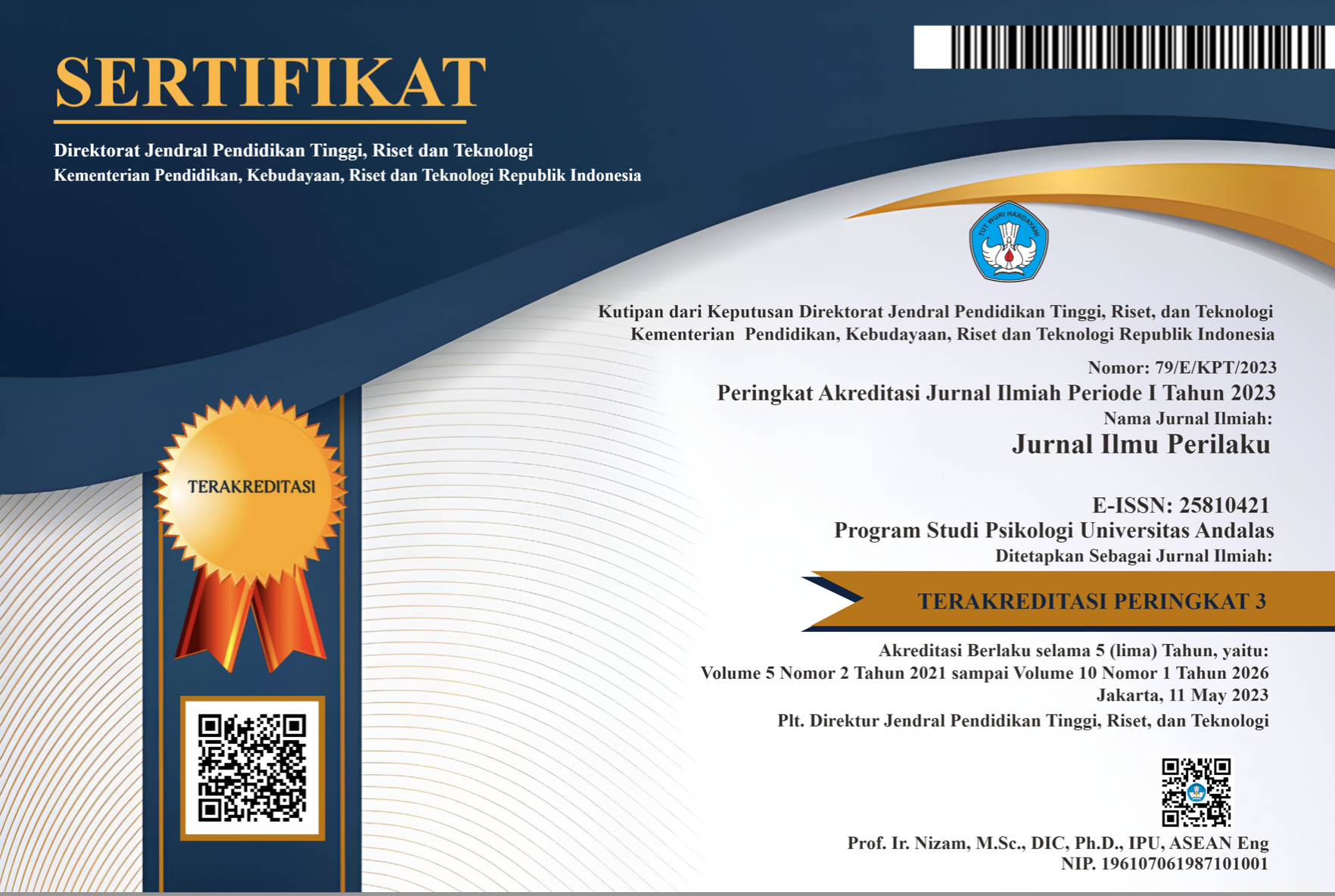Karakteristik Kepribadian, Harga Diri dan Gaya Hidup Hedonisme Pada Mahasiswa Konsumen Starbucks
Abstract
Coffee consumption of Indonesian people tends to increase over the past few years. Coffee drinking activity now tends to be a lifestyle where someone can spend time having fun. The purpose of this study was to determine the relationship between personality traits and self-esteem with hedonistic lifestyle on Starbucks consumer in Jakarta. The participants in this study consisted of 390 students who had visited Starbucks. Research participants were asked to fill out the Big Five Inventory-10 (BFI-10) questionnaire and Rosenberg self-esteem scale questionnaire that had been adapted to Indonesian, as well as the scale of the hedonistic lifestyle. The results showed that there was a significant negative relationship between self-esteem and hedonistic lifestyle, while conscientiousness personality traits had a significant positive relationship with the hedonistic lifestyle. This result explains that students can have a Hedonistic lifestyle when they do not have a positive assessment of themselves. The result of a significant positive relationship between conscientiousness personality and hedonistic lifestyle is in line with the results of previous studies which found a significant relationship between conscientiousness personality and caffeine consumption. Thus the tendency of coffee consumption based on the hedonism lifestyle is likely to be influenced by self-esteem and personality possessed.
Downloads
References
Hadijah, S. (2017). Kopi Indonesia terus meningkat dan jadi gaya hidup baru yang populer. Diunduh dari https://www.cermati.com/artikel/kopi-indonesia-terus-meningkat-dan-jadi-gaya-hidup-baru-yang-populer
Hartati, M. S., & Setyawan, I. (2010). Correlation among self-esteem with a tencency hedonist lifestyle of students at diponegoro university. Naskah tidak dipublikasikan, Fakultas Psikologi, Universitas Diponegoro. Diunduh dari http://eprints.undip.ac.id/24778/
Herlyana, E. (2012). Fenomena coffee shop sebagai gejala gaya hidup baru kaum muda. Thaqafiyyat, 13(1), 188-204. Diunduh dari http://ejournal.uin-suka.ac.id/adab/thaqafiyyat/article/view/43/42
Idris, M. (2017). Digemari kaum milenial, konsumsi kopi RI tumbuh 8%/tahun. Diunduh dari https://finance.detik.com/berita-ekonomi-bisnis/d-3497320/digemari-kaum-milenial-konsumsi-kopi-ri-tumbuh-8tahun
Maharani, S. (2018). Fenomena ‘demam’ coffee shop di Indonesia. Diunduh dari https://kumparan.com/@kumparanfood/fenomena-mewabahnya-demam-coffee-shop-di-indonesia
Ng, I. P. Y. (2015). Starbucks: Catalyst to hedonism among students today? Working Paper Series Faculty of Social Sciences, 81. Diunduh dari https://www.academia.edu/27102457/Starbucks_Catalyst_to_Hedonism_among_Students_Today
Ksendzova, M., Iyer, R., Hill, G., Wojcik, S. P., & Howell, R. T. (2015). The portrait of a hedonist: The personality and ethics behind the value and maladaptive pursuit of pleasure. Personality and Individual Differences, 79(2015): 68-74. Diunduh dari http://seanwojcik.com/Ksendova%20Iyer%20Hill%20Wojcik%20&%20Howell%202015.pdf
O’Connor, D. B., Conner, M., Jones, F., McMillan, B., & Ferguson, E. (2009). Exploring the benefits of conscientiousness: An investigation of the role of daily stressors and health behaviors. Ann Behav Med, 37(2): 184-196. Diunduh dari https://www.ncbi.nlm.nih.gov/pubmed/19322619
Rammstedt, B., & John, O. P. (2006). Measuring personality in one minute or less: A 10-item short version of the big five inventory in english and german. Journal of Research in Personality, 41(1): 203-212. Diunduh dari https://www.sciencedirect.com/science/article/abs/pii/S0092656606000195
Rikang, R. W., & Dharma, P. (2014). Orang Indonesia makin gemar minum kopi. Diunduh dari https://bisnis.tempo.co/read/589168/orang-indonesia-makin-gemar-minum-kopi/full&view=ok
Rosenberg, M. (1965). Society and the adolescent self-image. Princeton, NJ: Princeton University Press.
Trimartati. (2014). Studi kasus tentang gaya hidup hedonisme mahasiswa bimbingan dan konseling Universitas Ahmad Dahlan. Psikopedagogia, 3(1), 20-28. Diunduh dari http://journal.uad.ac.id/index.php/PSIKOPEDAGOGIA/article/view/4462/2581
Wijayanti. A., & Astiti, P. D. (2017). Hubungan antara konsep diri dengan perilaku konsumtif remaja di kota Denpasar. Jurnal Psikologi Udayana, 4(1), 41-49. Diunduh dari https://simdos.unud.ac.id/uploads/file_penelitian_1_dir/fa62f42dd31983bcb06c07bb1867e94b.pdf
Yuliyasinta., & Edwina, N. T. (2017). Gaya hidup hedonis pada mahasiswa di tinjau dari harga diri. Prosiding SEMNAS Penguatan Individu di Era Revolusi Informasi. 344-352. Diunduh dari https://publikasiilmiah.ums.ac.id/handle/11617/9068?show=full

This work is licensed under a Creative Commons Attribution-NonCommercial-ShareAlike 4.0 International License.
The non-commercial use of the article is governed by the Creative Commons Attribution license as currently displayed on Creative Commons Attribution-NonCommercial-ShareAlike 4.0 International License.
JIP's spirit is to disseminate articles published are as free as possible. Under the Creative Commons license, JIP permits users to copy, distribute, display, and perform the work for non-commercial purposes only. Users will also need to attribute authors and JIP on distributing works in the journal.
Please find the rights and licenses in Jurnal Ilmu Perilaku (JIP).
- License
The non-commercial use of the article will be governed by the Creative Commons Attribution license as currently displayed on Creative Commons Attribution-NonCommercial-ShareAlike 4.0 International License.
- Author’s Warranties
The author warrants that the article is original, written by stated author(s), has not been published before, contains no unlawful statements, does not infringe the rights of others, is subject to copyright that is vested exclusively in the author and free of any third party rights, and that any necessary written permissions to quote from other sources have been obtained by the author(s).
- User Rights
JIP's spirit is to disseminate articles published are as free as possible. Under the Creative Commons license, JIP permits users to copy, distribute, display, and perform the work for non-commercial purposes only. Users will also need to attribute authors and JIP on distributing works in the journal.
- Rights of Authors
Authors retain the following rights:
- Copyright, and other proprietary rights relating to the article, such as patent rights,
- The right to use the substance of the article in future own works, including lectures and books,
- The right to reproduce the article for own purposes, provided the copies are not offered for sale,
- The right to self-archive the article.
- Co-Authorship
If the article was jointly prepared by other authors, the signatory of this form warrants that he/she has been authorized by all co-authors to sign this agreement on their behalf, and agrees to inform his/her co-authors of the terms of this agreement.
- Termination
This agreement can be terminated by the author or JIP upon two months’ notice where the other party has materially breached this agreement and failed to remedy such breach within a month of being given the terminating party’s notice requesting such breach to be remedied. No breach or violation of this agreement will cause this agreement or any license granted in it to terminate automatically or affect the definition of JIP.
- Royalties
This agreement entitles the author to no royalties or other fees. To such extent as legally permissible, the author waives his or her right to collect royalties relative to the article in respect of any use of the article by JIP or its sublicensee.
- Miscellaneous
JIP will publish the article (or have it published) in the journal if the article’s editorial process is successfully completed and JIP or its sublicensee has become obligated to have the article published. JIP may conform the article to a style of punctuation, spelling, capitalization, referencing and usage that it deems appropriate. The author acknowledges that the article may be published so that it will be publicly accessible and such access will be free of charge for the readers.










